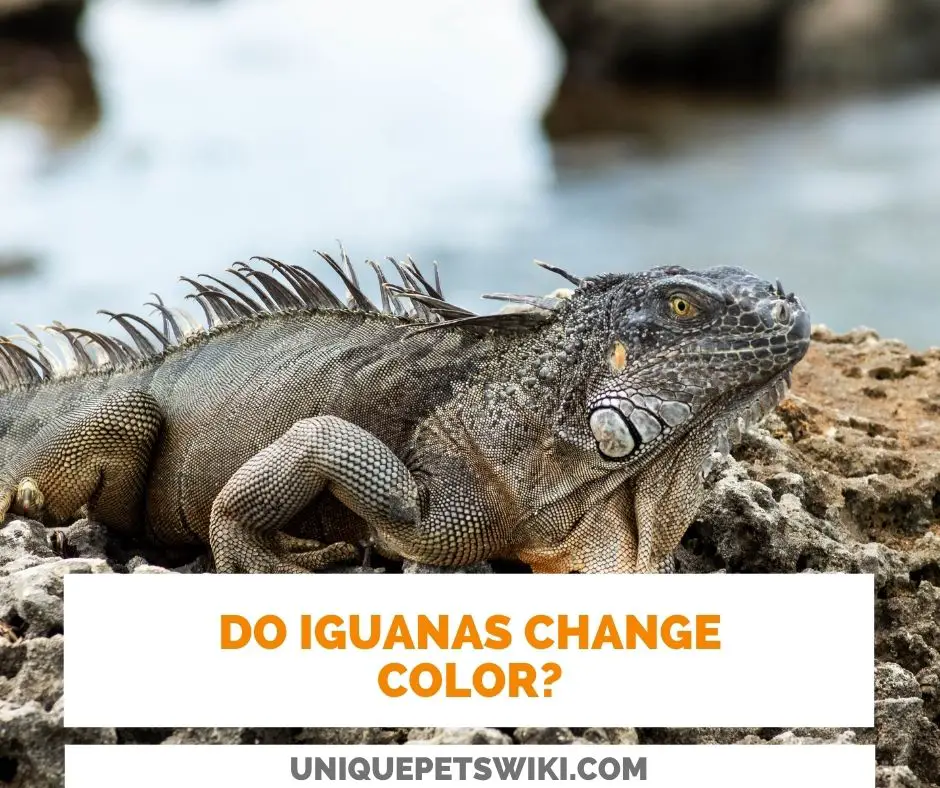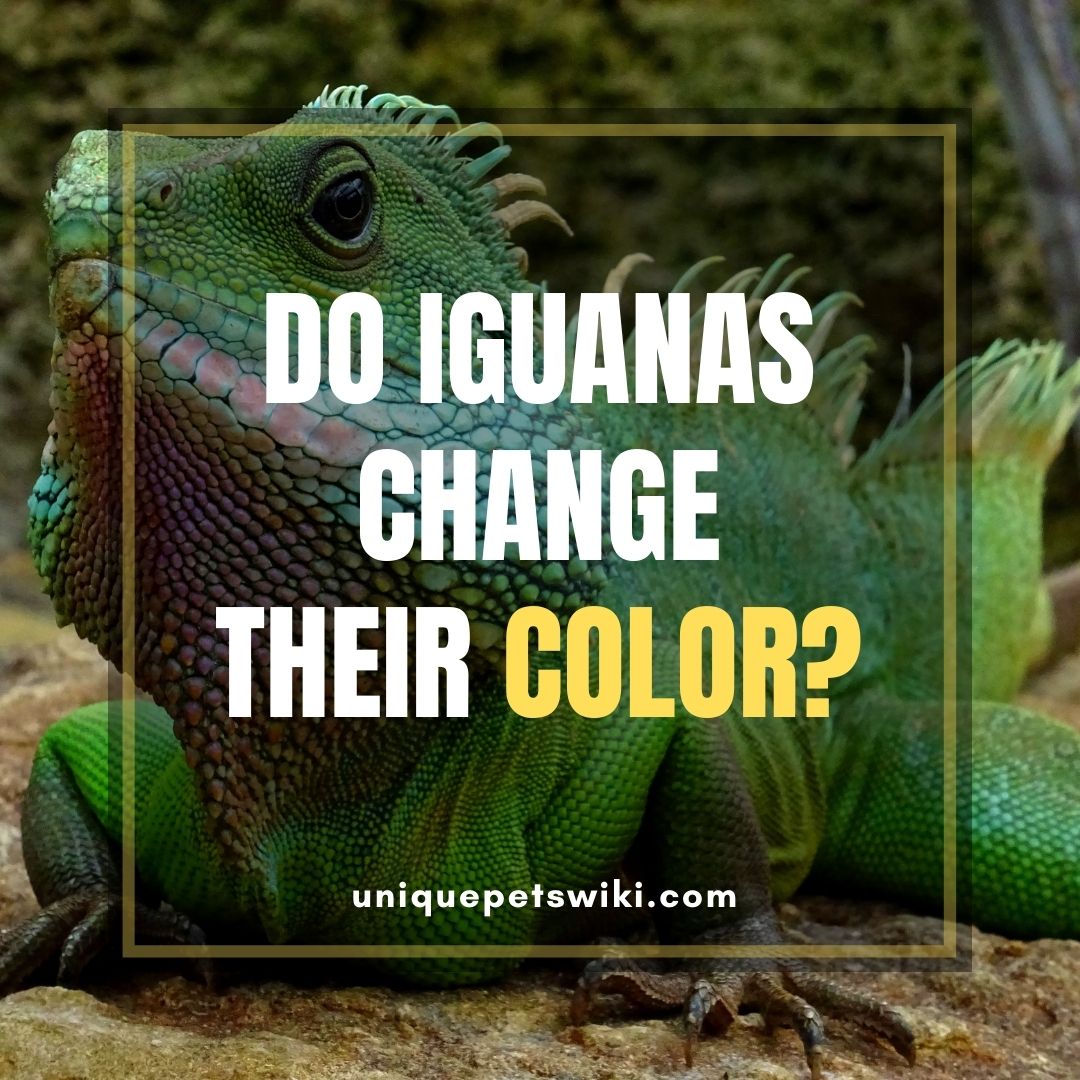Iguanas are fascinating creatures. Most pet owners choose them due to their uniqueness, especially their skin.
However, they are mostly confused about being camouflages like chameleons. Well, don’t be deceived.
Most people don’t know the difference between the chameleons and iguanas when it comes to change of skin color.
Therefore, we came up with this article to help you understand if iguanas can change color, and what makes them change.
By the end of this article, you will be able to tell why your iguana is turning brown, orange, or yellow.
Keep reading for these insights!
Contents
Do Iguanas Change Color?

Iguanas can change their skin color. They can change their color when stressed, sick, breeding, or shedding. Iguanas normally change their color to be more vibrant in most cases but sometimes, they completely change their color.
Chameleons change their color depending on the structural changes.
Iguanas do not change their color without reason. Their change of color is stimulated by the environment and can only occur at specific times during their lives.
Additionally, iguanas change their color with age. For instance, common iguanas change their color from green to dark green or brown as they get older.
Even so, it is worth noting that all iguanas do not come with one natural color. Iguanas have other morphs rather than the commonly known “green morphs.”
Therefore, genetic mutations also play a huge role in iguana’s skin color. Breeders selectively breed iguanas to create unique morphs.
As we stated earlier, iguanas commonly change their color to orange, brown, blue, or even yellow.
Why Is My Iguana Changing Color?
Your iguana can change color if they are hot, cold, sick, stressed, shedding, aging, or even when it’s breeding season. Therefore, the primary reason you iguana might change its color is to perform its body functions efficiently or dominate.
Let’s see some of those dominating or body functioning reasons why your iguana might change its color.
Shedding
A few weeks before shedding, iguanas can change their colors to grey or yellowish-grey. And since iguanas shed their skin in patches, white spots may appear where they are loose and about to shed.
Sick
Depending on iguana’s health issues, iguanas can change their color to yellow, pink, dark brown, black, or even mastered yellow.
For instance, when the iguanas have bacterial infections, their skin turns dark brown or black.
And, when they have liver disease, their skin may turn yellow. But, be careful not to confuse the yellow cast caused by liver disease to the shedding process.
Poor Habitation
Failure to provide your iguana with adequate temperature and humidity can cause them to change their color.
Therefore, if you find your iguana changing their color except during mating or shedding, you should look for the underlying reasons.
Mating Season
Both male and female iguanas change their color to orange when it’s time to mate. For males, the colors change to very bright orange to show dominance during the breeding season. As for females, their color changes to orange to become noticeable.
The iguanas can stay orange even after a few months after mating.
Genetics
Iguanas come in different colors known as morphs. There are many types of iguanas, to produce unique morphs, breeders selectively breed them, producing more unique morphs with different color variations and patterns.
Thus, iguanas can come with different colors such as yellow, grey, reddish, and turquoise. However, these colors become more prominent as they age.
Age
Age is another factor that might contribute to the change of color in iguanas. For instance, iguanas tend to become darker as they age.
Let’s now look at some of the most common colors that your iguana might represent.
Why Is My Iguana Orange?
Orange is mostly associated with breeding. Thus, if you see your iguana turning orange, you should know that the breeding season is at hand.
Iguanas change their color to orange to lure the possible mates. They can retain the orange color long after the breeding season is over.
The other reason why your iguana may turn to orange is when they want to dominate. Thus, if you own other pets and house them together, they can turn their color to orange to show dominance.
Why Is My Iguana Turning Brown?
When baby iguanas are born, they usually have the very bright green. However, as they get older, their color starts to fade. Thus, they appear browner when they are older.
Additionally, they also develop patterns such as zigzag, stripes, and other markings. The approximate age that the iguanas start to turn brown is from the age one and half to two years.
However, other reasons could cause your iguana to turn brown including:
Low Temperatures
When Iguanas get cold, their color gets darker to attract more heat. However, when they start to get warmer, they retain their typical color.
When their cage is extremely hot, your iguana’s color can get lighter.
Stress
Another reason that can cause your iguana to get brown or darker is stress. It could be due to a small cage, improper habitation setup, or improper diet.
However, these reasons only cause their stripes to get darker and not the whole body.
Skin Infections
Fungal and bacterial infections can also cause your iguana to appear darker. However, it’s easy to differentiate skin infections from aging iguanas.
It is because skin infections only cause them to have brown or dark spots that are crusty and peeling off.
Health Issues
Health issues can cause your iguana to turn dull, grey, yellow, or muddy. However, you can tell a sick iguana if its dark color is accompanied by other symptoms such as weight loss, limb dragging, twitching, or lethargy.
Sick iguanas should be treated immediately by a qualified exotic vet doctor.
Mite Infestation
Mite infestation causes iguana’s skin to appear dark or red spots either on the surface or under the scales. Always treat iguana’s substrate before use to prevent mite infestation.
You should also isolate new iguanas and treat them against mites before introducing them to the other pets in your home.
Why Is My Iguana Turning Yellow?
When your iguanas are just about to start shedding, it is normal for them to turn slightly yellow.
However, the yellow coloration is usually in patches and appears yellow-white.
But, if you see your iguana turning yellow when it’s not time to shed, it could be due to liver infections, and thus, you should immediately consult a veterinarian.
However, genetic mutations can also be the reason for your iguana to appear yellow. For instance, albino morphs have a bright yellow coloration.
Fully understanding your iguanas will help you better take care of them. As a suggestion, we would recommend you to get a good iguanas book. Not to become an expert on iguana care but will help you avoid the common mistake in new pet lizard owners.
Wrapping Up
Age, improper habitation, stress, and health issues are the primary causes of your iguanas to change color.
Therefore, it is critical to observe small changes in color as iguanas use color change to communicate.
As you continue learning more about your iguana, you will notice that iguanas have a different color when happy from when stressed.
Therefore, it is your responsibility as the iguana pet owner to look for the underlying reasons for your iguana’s change of color.
We hope that this article will help you differentiate a sick from a healthy iguana by observing their skin coloration.
